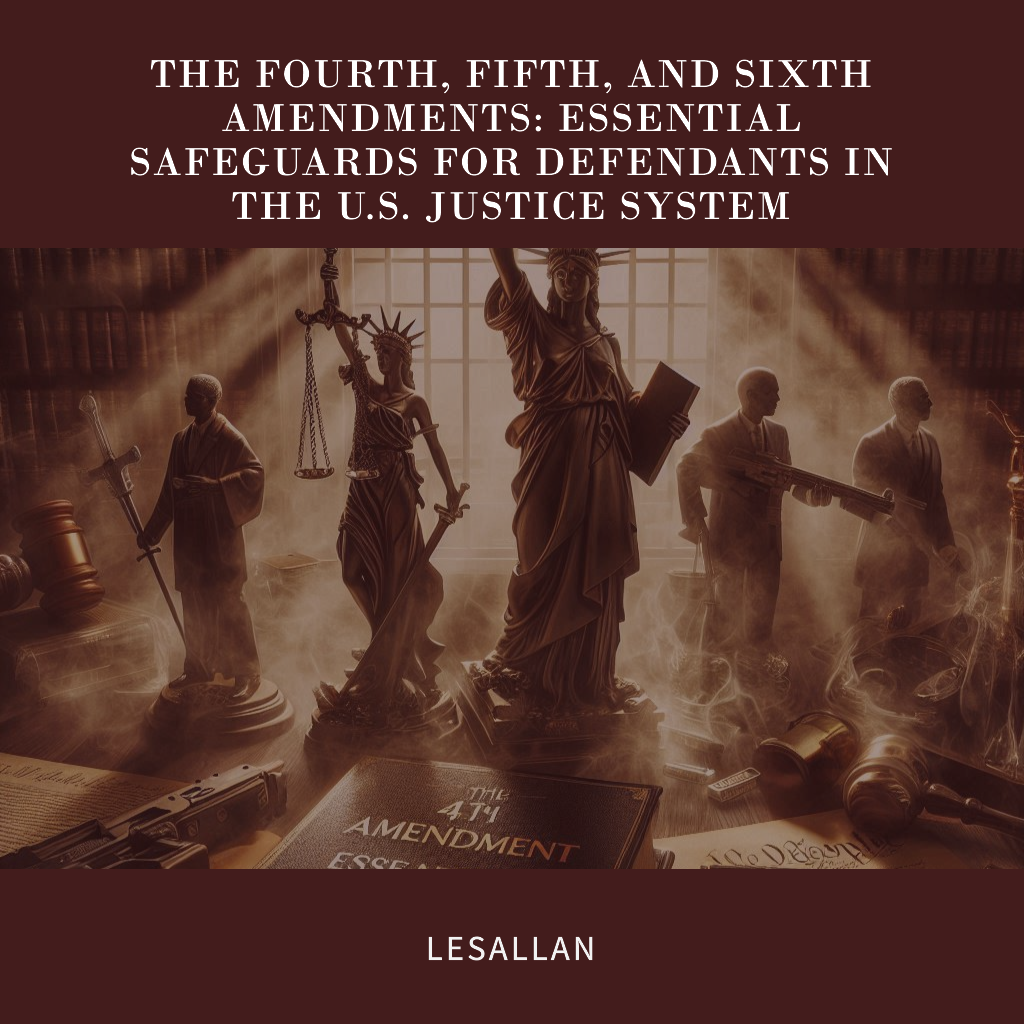Lesallan July 20, 2024

The Fourth, Fifth, and Sixth Amendments: Essential Safeguards for Defendants in the U.S. Justice System
The Fourth, Fifth, and Sixth Amendments of the United States Constitution, integral components of the historical Bill of Rights, are legal provisions and indispensable pillars of protection for defendants within the U.S. Justice System. This historical document provides a robust framework for the justice system, shielding individuals from potential overreach by law enforcement. The Fourth Amendment expressly prohibits unreasonable searches and seizures (Maclin, 2024), standing as a crucial safeguard of personal privacy and liberty. Concurrently, the Fifth and Sixth Amendments ensure the principles of due process, fair treatment, and the right to a speedy and public trial, solidifying the bedrock of the American criminal justice system. These formidable amendments uphold the fundamental values of fairness, justice, and respect for individual rights, providing security and confidence in the legal system.
The United States Constitution, a cornerstone of American democracy and the foundation of the American legal system contains robust protections for individuals accused of crimes through the Fourth, Fifth, and Sixth Amendments. This document is designed to ensure due process of law and serve as a critical check on the authority of law enforcement agencies (Thomas, 2024). The American justice system enshrines crucial rights that protect individuals, including safeguarding against unwarranted searches and seizures, the right to choose to remain silent, and the right to legal representation. These rights uphold the fundamental principle of innocent until proven guilty in the legal process (Lynch, 2024). These protections demonstrate the commitment to a just legal process and provide reassurance about the fairness and integrity of the judicial system.
The Fourth Amendment to the United States Constitution protects individuals’ privacy rights. It requires law enforcement to seek a warrant from a judge, based on probable cause, before they can search or seize (Maclin, 2024). This amendment establishes clear boundaries for law enforcement agencies, ensuring their adherence to legal procedures while respecting individuals’ privacy. It upholds the fundamental principle that “a man’s home is his castle,” emphasizing the right to security and privacy within one’s residence and personal space. The Fourth Amendment is essential in balancing effective law enforcement with individual rights and upholding a fair and just legal framework (Maclin, 2024).
The Sixth Amendment of the United States Constitution enshrines crucial rights for individuals facing criminal accusations. These rights ensure defendants’ fair and just treatment within the American justice system. Individual rights within the legal system typically encompass entitlements such as the right to a timely public trial, access to legal counsel, the presence of an unbiased jury, and being informed of the specific nature and basis of the charges (Lynch, 2024). Furthermore, defendants have the right to confront witnesses against them. These rights are essential in upholding the principle of “innocent until proven guilty” and are integral to preserving justice in the legal process. They protect the accused and uphold the judicial system’s integrity (Lynch, 2024).
In summary, the Fourth, Fifth, and Sixth Amendments play a critical role in safeguarding the rights of individuals within the criminal justice system. These amendments serve as a vital protection against potential abuses of power by law enforcement and ensure fair and equitable treatment for all individuals involved in legal proceedings. A comprehensive understanding of these amendments and their implications is essential for everyone within the criminal justice system, including law enforcement officers, defense attorneys, prosecutors, and judges, to uphold the principles of justice and protect the rights of all individuals involved (Maclin, 2024; Thomas, 2024; Lynch, 2024).
References:
Lynch, T. (2024). The Sixth Amendment: The right to a fair trial. American Journal of Criminal
Law.
Maclin, T. (2024). The Fourth Amendment: Unreasonable searches and seizures. Constitutional
Law Quarterly.
Thomas, G. C. (2024). The Fifth Amendment: A comprehensive guide. Journal of Criminal
Justice.



4 Comments
먹튀검증 · July 25, 2024 at 2:57 am
https://m-today.net/verify
amazingwise · August 3, 2024 at 7:54 am
you are in reality a just right webmaster The site loading velocity is incredible It seems that you are doing any unique trick In addition The contents are masterwork you have performed a wonderful task on this topic
soapertv · August 3, 2024 at 12:00 pm
Ive read several just right stuff here Certainly price bookmarking for revisiting I wonder how a lot effort you place to create this kind of great informative website
Temp mail · August 3, 2024 at 2:54 pm
I was just as enthralled by your work as you were. The visual display is refined, and the written content is of a high caliber. However, you seem anxious about the possibility of delivering something that could be perceived as questionable. I believe you’ll be able to rectify this situation in a timely manner.
Comments are closed.